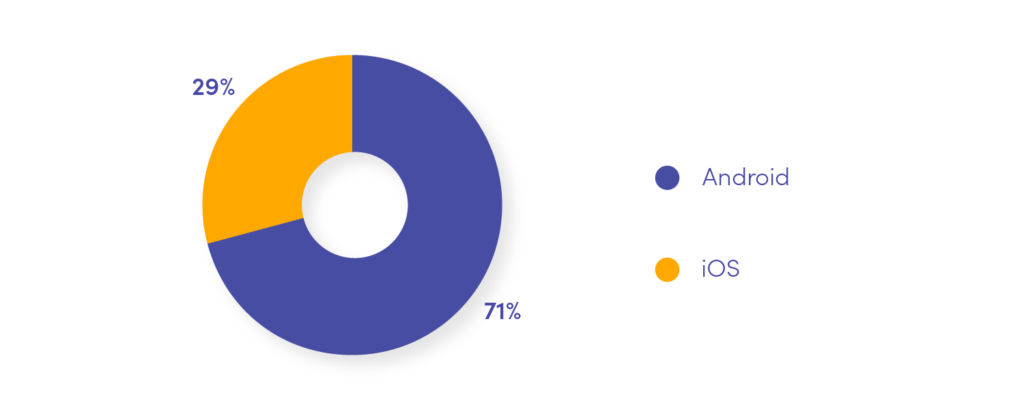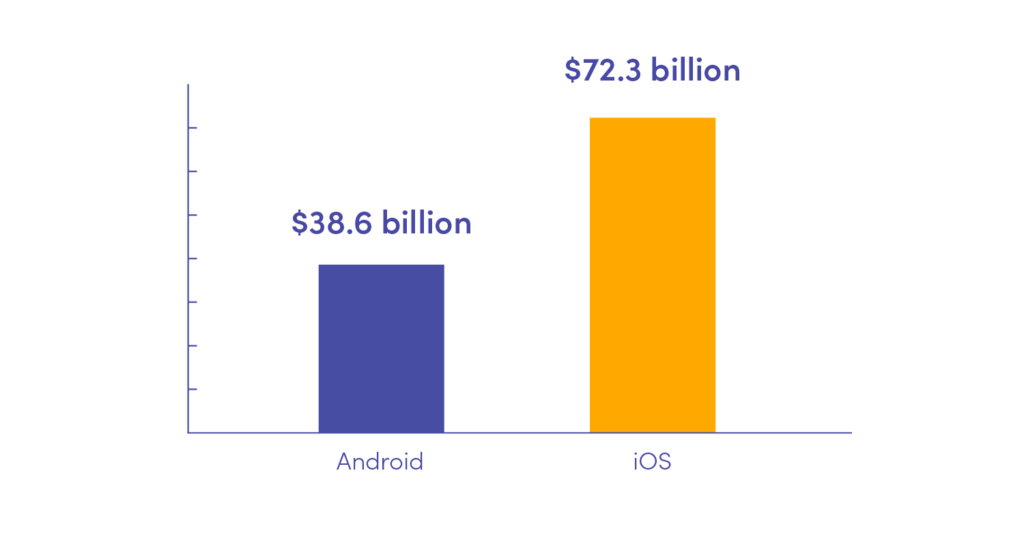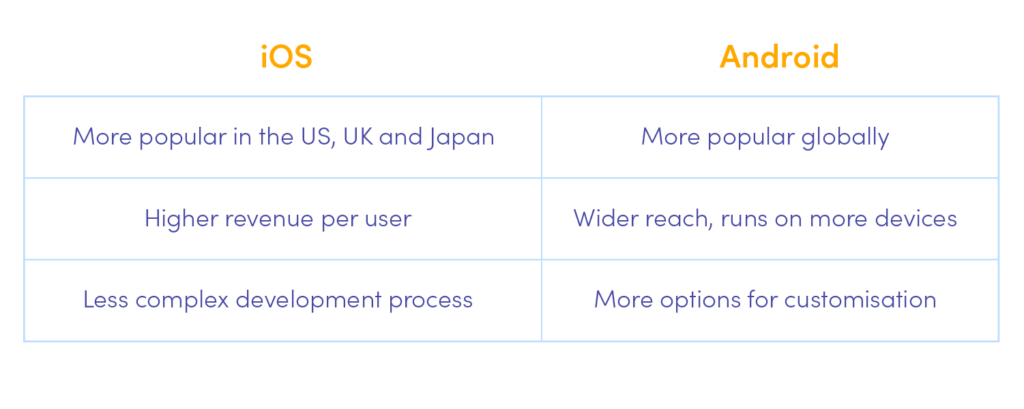Having a polished idea for a mobile app is the first big step towards success. The next decisions are equally as important: it is time to start the journey from idea to a finished product and choose the best operating system for your project.
The question ‘iOS or Android?’ might not be an easy one to answer, as it depends on various factors such as your budget, time and business needs. While you might’ve read more than once that developing for both platforms simultaneously would be the best solution, that’s not the case for every project.
So which option should you choose? Read on to find out!
iOS vs Android: the pros and cons
In this article, we’re going to take a closer look at both platforms, and hopefully make that call much easier for you. Specifically, we’re going to talk about iOS vs Android in terms of:
- Market share
- Target audience and revenue
- Time to market
- Costs
- Flexibility and customisation
Android is the undisputed winner when it comes to the global market share: as of now, 71% of smartphones are equipped with Android. This dominance is even more visible in countries such as Brazil, India or Turkey, where the operating system runs on over 85% of devices.

It’s worth noting that the gap between Android and iOS is narrowing a bit as of recent years, seeing how Android’s worldwide market share used to be 80% back in 2018. But even though iOS is slowly catching up, Android is predicted to maintain its global influence in the upcoming years.
However, let’s not forget that iOS is by far the most popular OS in the United States. Apple’s OS holds over 60% of the market there, increasing its dominance in 2020 and 2021. iOS is also the winner in Japan where the numbers are similar to the US, and is a big player in the UK (52% as of Q1 2021). If your main target audience is located in those regions, then iOS might be the best bet.
Target audience and revenue
We’ve already mentioned user location when talking about market share, but that’s not all there is to your target audience.

While Android is used by more people worldwide, it is important to note that iOS users statistically bring more revenue, are much more likely to pay for apps and make in-app purchases, and are generally wealthier. In 2020, consumer spending on App Store was almost two times higher than on Google Play Store. iOS users also tend to be more loyal than Android ones – once they pick Apple, they mostly stick to it.
Time to market
In general, the time it takes to develop a mobile application depends on the complexity of the idea, the features you want your app to have, and various different factors. That said, there are factors that play a huge role when it comes to time to market for both iOS and Android.
The biggest one for Android is the vast number of devices it can run on. We’re talking mobile phones, tablets, smart TV’s home appliances – the list goes on. This means that your app will have to be adjusted to a variety of screen sizes and resolutions, which makes the development process longer. iOS, on the other hand, only runs on Apple devices, which makes both development and testing less time-consuming.
Having said that, the AppStore is much stricter when it comes to its guidelines and reviewing submitted applications than Google Play Store. If you want your app to be quickly published, then Android might be the better choice.
Cost
Time is money. As you’ve probably figured out, the cost of your application will be related to the time it takes to develop it. Because of the fragmentation of Android and the fact that the app needs to fit many different devices and system versions, the cost of development may become higher. But as we’ve previously mentioned, the overall cost has less to do with the OS you choose, and more with the complexity of your idea.
Contact us to get an estimate for your Android or iOS app in 2 business days!
From the development side, it is worth mentioning that in order to publish an app in the App Store, a 99$ yearly fee needs to be paid for the Apple Developer Program. With Google Play Store, you only need to pay 25$ once for the Google Developer Account, and you’re set for life.
Flexibility and customisation
We’ve gone through the major business-related factors influencing the choice between iOS and Android, now let’s talk about the app itself.
Seeing as Android is open-source, it leaves developers with more freedom to experiment with the functions and features of the app. With Android, you can craft an app that truly stands out from the crowd and is customised just the way you want it to be. On the other hand, because of the restrictions, constraints and guidelines for apps published on the App Store, the possibilities for app customisation are more limited with iOS.
That said, the open-source nature of Android comes with a price, as it is generally considered to be more prone to security issues than iOS.

Cross-platform development
All right, we’ve gone through the up and downsides of developing an app for both Android and iOS. But other than developing one or the other, or even each one simultaneously, there’s actually another option – building one app that works for both.
Cross-platform development means less money spent, a faster time to market, and one code base for both the Android and iOS app. Besides, with the rising popularity of languages such as Flutter, you also get a great user interface and the ability to scale across different platforms and OS, without changing the UI.
Learn more about Flutter app development here.
It’s worth remembering, however, that when it comes to performance, responsiveness, and getting the most out of platform-specific features, building the app separately for each platform is the better option.
Summary
The ‘there’s no one size fits all’ mantra applies very well when it comes to choosing between iOS and Android. It’s not a question of which one is better, but which one fits your project and business plan best.
Need help in choosing the right option for your project? Don’t hesitate to contact our experts!



